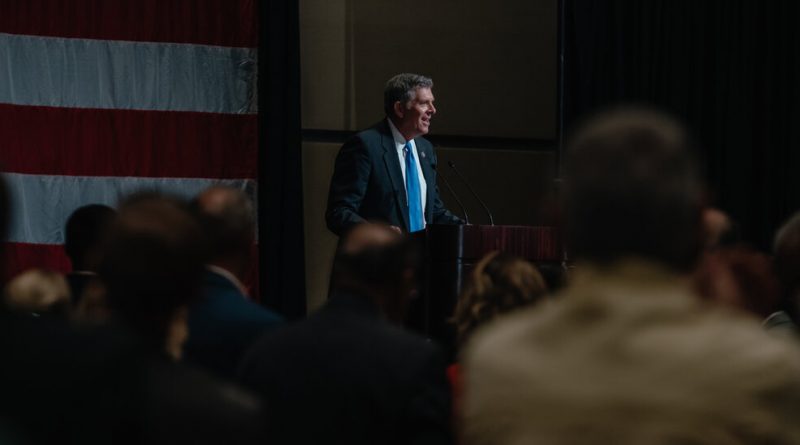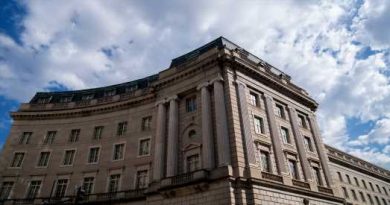F.B.I. Feared Lawmaker Was Target of Foreign Intelligence Operation
WASHINGTON — The F.B.I. was examining whether a foreign government had targeted a Republican lawmaker for an intelligence operation when the bureau conducted botched searches for information about him within messages swept up under an expiring warrantless surveillance law, according to people familiar with the matter.
The disclosure helps clarify the circumstances surrounding the scrutiny of the lawmaker, Representative Darin LaHood of Illinois, and carries policy implications as Congress debates whether to reauthorize the surveillance law, known as Section 702.
The question of what happened has lingered over that debate since December, when the government declassified a report about incidents in which F.B.I. officials had failed to comply with rules for retrieving messages gathered under the law. A footnote revealed that an intelligence analyst had used the name of a member of Congress as a search term without including necessary limiting terms to screen out any irrelevant messages.
Last month, one major piece of the puzzle came into view when Mr. LaHood said at a House Intelligence Committee hearing that he had concluded that he was the lawmaker.
Mr. LaHood provided no further details about why the F.B.I. had searched for information about him. But people familiar with the matter, speaking on the condition of anonymity to discuss a sensitive matter, filled in some of the remaining blanks.
The F.B.I., the people said, did not suspect Mr. LaHood of any wrongdoing. Rather, it was investigating suspicions that a foreign government had targeted him as part of an espionage or covert influence intelligence operation. Seeking more information to help determine whether he was a potential victim, it queried for messages mentioning his name as a defensive measure.
The people familiar with the matter declined to identify the foreign government. But the queries, which they said unfolded earlier in 2019, happened when Mr. LaHood was heavily engaged in China trade policy, including discussing tariffs and the possibility of a trade deal with officials from both China and the Trump administration.
Mr. LaHood declined to comment for this article.
Section 702 allows the government to obtain, without a warrant, the messages of targeted foreigners abroad from American companies like Google and AT&T — even when those foreigners are communicating with or about Americans. Enacted in 2008, it legalized a version of the once-secret warrantless surveillance program the Bush administration set up after the Sept. 11, 2001, attacks.
Civil liberties advocates have long opposed or sought to curb Section 702 because of its implications for Americans’ privacy. Congress reauthorized it in 2012 and 2018, but it is expected to face steeper odds this year because many Republicans have aligned themselves with former President Donald J. Trump’s hostility to the F.B.I. and national security surveillance.
Mr. LaHood, a former counterterrorism prosecutor, supports reauthorizing Section 702 and leads a bipartisan group of House Intelligence Committee members who are studying how to persuade Congress to pass such a bill. But he is also very interested in international trade.
His district in Illinois, which includes Peoria and many rural counties, has manufacturers like Caterpillar and farmers who grow commodities like soybeans and sorghum, which China imports. That put him in a difficult position when Mr. Trump began a trade war with China and imposed tariffs on Chinese goods. In retaliation, China imposed tariffs that threatened to hurt the economy in Mr. LaHood’s district.
In early 2019, Mr. LaHood helped sponsor a bill that would make it easier for Congress to block changes to tariffs. As a chairman of a U.S.-China Working Group in the House, he also traveled to China that March with a congressional delegation and met with top Chinese agricultural and commerce officials in an effort to improve the trade relationship.
In public comments throughout the spring and summer, Mr. LaHood tried to straddle Mr. Trump’s tough stance toward China and his district’s need to de-escalate the trade war. He repeatedly echoed Mr. Trump’s criticism of Chinese trade practices, but also argued that both sides needed to strike a deal that would ease the tariffs.
What we consider before using anonymous sources. Do the sources know the information? What’s their motivation for telling us? Have they proved reliable in the past? Can we corroborate the information? Even with these questions satisfied, The Times uses anonymous sources as a last resort. The reporter and at least one editor know the identity of the source.
In the declassified report detailing the botched queries, overseers notably did not deem it an abuse that the F.B.I. had looked for information about a lawmaker per se, meaning there was an authorized purpose and a sufficient basis for the searches to be conducted. The problem, in the report’s telling, was only that the queries were too broadly worded.
As a general matter, a senior official said, foreign intelligence services regularly target high-level American government officials — including lawmakers, their staff members and their associates — for both intelligence gathering and covert influence efforts.
When facts specifically indicate that may be happening, counterintelligence analysts query the Section 702 repository for more information, hunting for any messages in which foreign agents discussed how to gain access to officials, tried to set up engagements with officials or tried to directly communicate with officials who may be unaware of the links to a foreign government.
At the Intelligence Committee hearing last month, Mr. LaHood echoed Trump-style Republican critics of the F.B.I. by accusing the bureau of having abused its surveillance powers. The searches were careless, he said, describing them as an “egregious” violation, and declaring that it had a trust problem. But he also called Section 702 a critical tool and argued that Congress should reauthorize it.
He elicited testimony from the F.B.I. director, Christopher A. Wray, about reforms the bureau made in 2021 and 2022 to tighten limits on retrieving information gathered using Section 702. (The changes include requiring a deputy director to approve “sensitive” queries involving elected officials.)
Mr. LaHood concluded by asking a series of intelligence officials to explain why Section 702 was needed to counter China.
Avril Haines, the director of national intelligence, responded, for example: “It’s crucial in the context of counterintelligence where we are looking at where it is that China’s efforts to send spies into the United States may be and what their planning is in relation to it.”
The disclosure of the context of the queries comes as some privacy advocates want Congress to require the government to get a warrant from a court before it may query for information about an American.
The House in 2014 and 2015 voted to bar queries for information about Americans without court orders, but the proposal faltered. In 2018, Congress required the F.B.I. to obtain a court order to read any results from queries about an American who is already the subject of a criminal investigation, but wrote the rule so narrowly that it does not apply to most queries.
The discussion of proposals to impose a warrant requirement for queries about Americans has largely centered on situations where the subject is an investigative target. There has been less discussion about what that change would mean for defensive searches, where there is no probable cause to believe the subject has engaged in wrongdoing.
If Congress wanted to impose a warrant requirement while preserving the ability to conduct defensive searches, it could make an exception for that category or craft a different legal standard for court orders. David Kris, a former senior Justice Department national security official, said one possibility could be to have judges weigh whether under the “totality of circumstances,” a defensive query would be reasonable.
But Sean Vitka, a policy counsel for Demand Progress Action, a civil liberties group, expressed skepticism about creating an exception or lower standard for queries if the F.B.I. deems their purpose to be defensive.
“Frequently there is ambiguity as to whether someone is a witness or a target, and there’s no ‘defensive’ or ‘offensive’ distinction in the Fourth Amendment — a search is a search,” he said.
Source: Read Full Article


